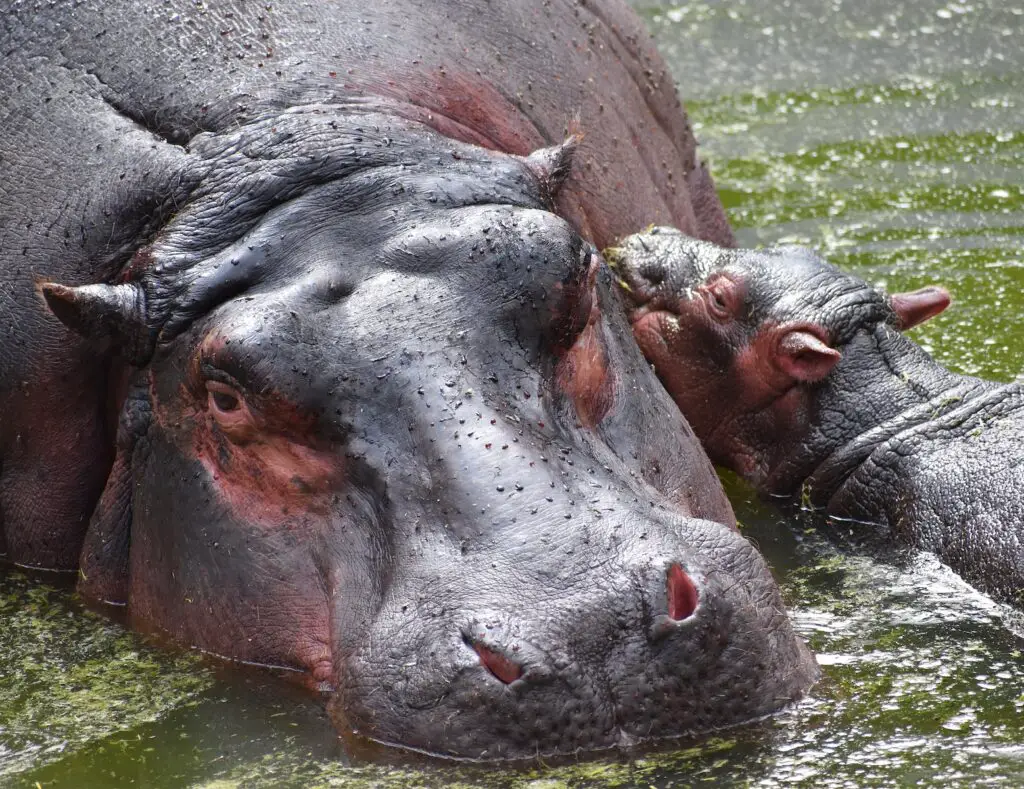Do hippos and crocodiles get along?
Do hippos and crocodiles get along?
Hippos and crocodiles do not get along because they are natural enemies. While they may share a river or a body of water, they frequently compete for resources and territory.
Hippos are known to be aggressively territorial and protective of their offspring.
They can weigh up to 3,000 pounds and run up to 30 miles per hour on land, making them a formidable foe for any predator.
They are known to defend themselves with their massive jaws and sharp teeth against any potential threats.
Crocodiles, on the other hand, are well-known for their aggressive and predatory behaviour.
They are excellent hunters, easily taking down prey much larger than themselves. Crocodiles have strong jaws and razor-sharp teeth designed to rip flesh and bone.
Crocodiles have strong jaws and razor-sharp teeth designed to rip flesh and bone.
They are also known for their stealthy hunting abilities, as they can lie in wait for long periods of time underwater before attacking their prey.
While hippos and crocodiles may share the same habitat on occasion, they usually avoid each other.
Hippos are known to be afraid of crocodiles and will frequently chase them away if they get too close. Similarly, crocodiles will typically avoid areas where hippos are present in order to avoid a confrontation with these powerful animals.
There are some instances where hippos and crocodiles may collide. If a crocodile attacks a young hippo, the adults may retaliate by attacking the crocodile.
Similarly, if a hippo wanders into a crocodile’s territory by accident, the crocodile may see it as a potential food source and attack it.
Overall, while hippos and crocodiles may coexist in the same habitats, they do not get along and are natural enemies in the wild. They are both powerful and dangerous animals that are capable of inflicting serious harm on each other, so it’s best for them to stay out of each other’s way.

Would a hippo or crocodile win in a fight?
A fight between a hippo and a crocodile in the wild would be a rare and dangerous occurrence. Both animals are extremely powerful and have distinct advantages in such a confrontation.
Hippos are large animals that can weigh up to 3,000 pounds and are notorious for their aggression and territorial behaviour. They are a formidable opponent due to their massive jaws and sharp teeth that can easily crush bones.
Hippos are also extremely fast and agile in the water, making crocodile capture difficult.
Crocodiles, on the other hand, are known for their stealthy and predatory behaviour. They have strong jaws and razor-sharp teeth that can easily rip flesh and bone. Crocodiles are also very patient hunters, capable of waiting for their prey to approach before striking.
The outcome of a fight between a hippo and a crocodile would most likely be determined by the circumstances of the encounter. If a crocodile surprises a hippo while it is grazing on land or in shallow water, the hippo could be caught off guard and inflict serious damage with a surprise attack. If the hippo is aware of the crocodile’s presence, it can use its size and strength to scare and chase the crocodile away.
A hippo would have a significant advantage in the water due to its speed and agility. It could defend itself against a crocodile attack with its powerful jaws and teeth, and it could also use its body to ram and crush the crocodile if necessary.
Overall, predicting the outcome of a fight between a hippo and a crocodile is difficult because both animals are extremely powerful and dangerous.
However, such a confrontation is best avoided because it could result in serious injury or even death for both animals involved.
Can a crocodile kill a hippopotamus?
A crocodile is unlikely to kill an adult hippopotamus because hippos are much larger, stronger, and more aggressive than crocodiles.
Adult hippos can weigh up to 3,000 pounds, whereas crocodiles range in size from 200 to 1,000 pounds.
Hippos have massive jaws and sharp teeth designed for crushing and tearing, making them a formidable enemy.
Having said that, crocodiles are known to attack and kill young or weak hippos. In such cases, the crocodile would usually surprise the young or vulnerable hippo, grabbing it by the leg or tail and dragging it into the water.
Once in the water, the crocodile would try to drag the hippo underwater and drown it with its powerful jaws and teeth.
Adult hippos will usually come to the aid of the young or vulnerable hippo, attacking the crocodile with their powerful jaws and teeth. This behaviour demonstrates how protective and territorial hippos are, as well as how unlikely it is for a crocodile to kill an adult hippopotamus.
Overall, while crocodiles may be able to kill young or weakened hippos, it is highly unlikely that they could take down a healthy, adult hippopotamus.
Do hippos eat crocodiles?
Hippos are primarily herbivorous and rarely hunt crocodiles. Their diet consists primarily of grasses and other vegetation, though they have been known to consume small fish and invertebrates on occasion.
Having said that, there have been reports of hippos attacking and killing crocodiles, especially if the crocodile threatens the hippo’s young or territory.
In such cases, the hippo would crush the crocodile with its powerful jaws and teeth or trample it with its massive body.
However, such occurrences are relatively rare, and hippos do not actively seek out crocodiles as prey. Crocodiles are not hippos’ primary food source and are not considered a significant part of their diet.
While hippos are primarily herbivorous, they have been observed eating small animals such as fish, birds, and even other mammals on occasion. These instances of animal predation by hippos are uncommon and usually occur when the animal is in distress or hungry.
There have been reports of hippos attacking and killing crocodiles, particularly when the crocodile threatens the hippo’s young or territory.
In South Africa’s iSimangaliso Wetland Park, for example, a hippo was observed attacking and killing a crocodile in 2017. According to reports, the hippo charged the crocodile and crushed it with its massive jaws, most likely to defend its territory or young.
While such incidents are uncommon, they do demonstrate hippos’ incredible strength and territorial behaviour.
Hippos are extremely territorial and can be extremely aggressive, especially when defending their young or territory.
If you come across a hippo or a crocodile in the wild, exercise caution and give these animals plenty of space to avoid any potential conflicts.
Are hippos or crocodiles more dangerous?
Hippos and crocodiles are both extremely dangerous animals that should be approached with caution in the wild.
Hippos, along with crocodiles, are responsible for more human deaths in Africa than any other large animal.
Hippos are known for their aggressive behaviour and can be extremely territorial, especially during mating season, despite their seemingly docile appearance. They have massive jaws and sharp teeth that can easily crush bones, and they can charge at incredible speeds on land and in water.
Crocodiles, on the other hand, are known for their predatory behaviour and are known for being stealthy and patient hunters. They are powerful creatures with razor-sharp teeth capable of inflicting serious injury or death with a single bite.
Crocodiles are also known to be aggressive when threatened or when their territory is violated, and they are capable of launching unexpected and lethal attacks on humans or other animals.
Overall, Hippos and crocodiles are both dangerous animals that should be respected and approached with caution in the wild. The best way to stay safe is to keep a safe distance from these animals and avoid any behaviour that could be perceived as threatening, such as approaching a crocodile while it is feeding.
Why do hippos save other animals?
Hippos are notorious for their aggressive behaviour, and they can be extremely territorial and even hostile to other animals, including humans.
However, there have been reports of hippos displaying altruistic behaviour towards other animals in some cases.
Hippos may exhibit protective behaviour towards other animals for a variety of reasons.
One theory is that hippos have a strong maternal instinct and may feel obligated to protect young animals even if they are not their own offspring. This is especially true when the young animal is in distress or danger.
Another theory is that hippos have symbiotic relationships with other animals in their environment. Hippos, for example, may tolerate certain fish or bird species that clean parasites from their skin or feed on the algae that grows on their backs. In such cases, the hippos may protect these animals in order to maintain this mutually beneficial relationship.
While there have been some cases of hippos displaying protective behaviour towards other animals, these incidents are relatively rare and should not be interpreted as typical of the species.
Hippos are known to be highly aggressive and territorial animals, so when encountering them in the wild, it’s important to exercise caution and respect their space.
Hippos are social animals that live in pods that can range in size from a few to over a hundred people. This social behaviour may extend to other animals, as hippos may feel responsible for their pod members, which may include non-hippo species.
According to some researchers, hippos may exhibit protective behaviour towards other animals in order to reduce their own stress levels. When a young animal is in distress or danger, the animal’s vocalisations and behaviour may cause stress in nearby hippos. Hippos may be able to reduce their own stress levels by intervening and protecting the animal.
Hippos have a complicated and varied relationship with the other animals in their habitat. While they are primarily herbivorous, they may interact with a variety of other animals, including fish, birds, and even crocodiles.
Some researchers believe that hippos’ protective behaviour towards other animals reflects their role as keystone species in their ecosystem, helping to maintain the balance and health of their environment.
Finally, hippos’ protective behaviour towards other animals should not be interpreted as an indication of the animal’s temperament or personality. While some hippos may exhibit altruistic behaviour towards other animals, the species as a whole is known for its aggressive and territorial behaviour.
When encountering hippos in their natural habitat, it is important to exercise caution and respect, as with any wild animal.
